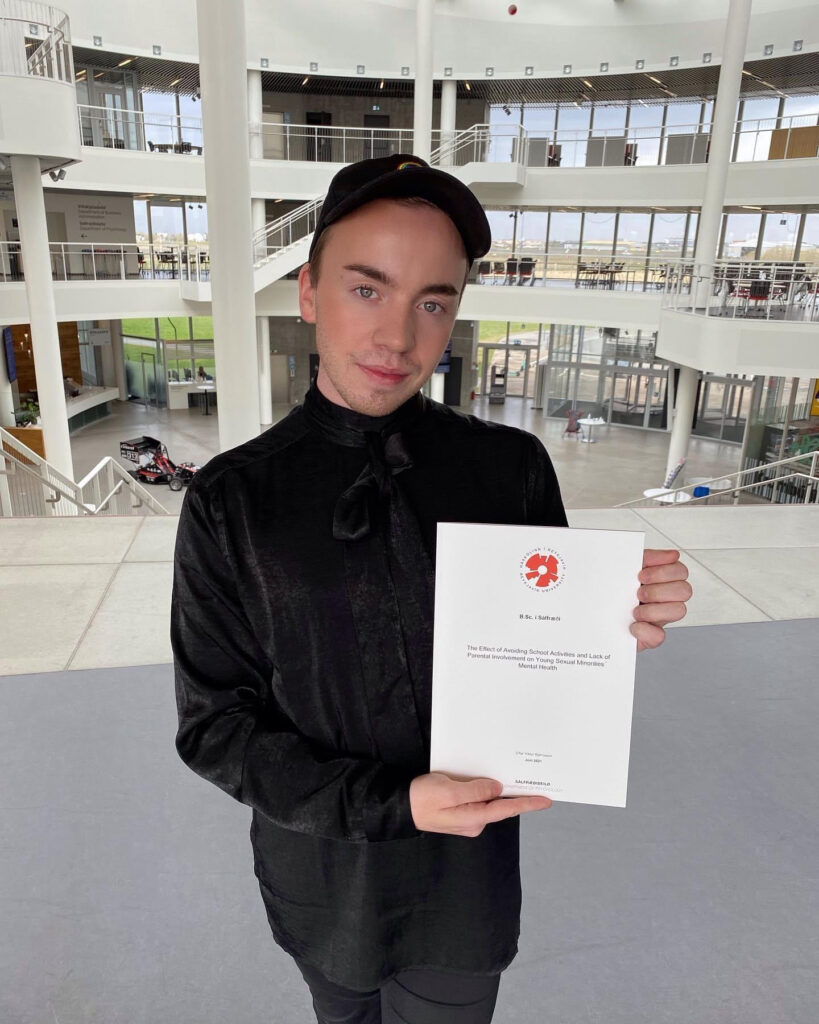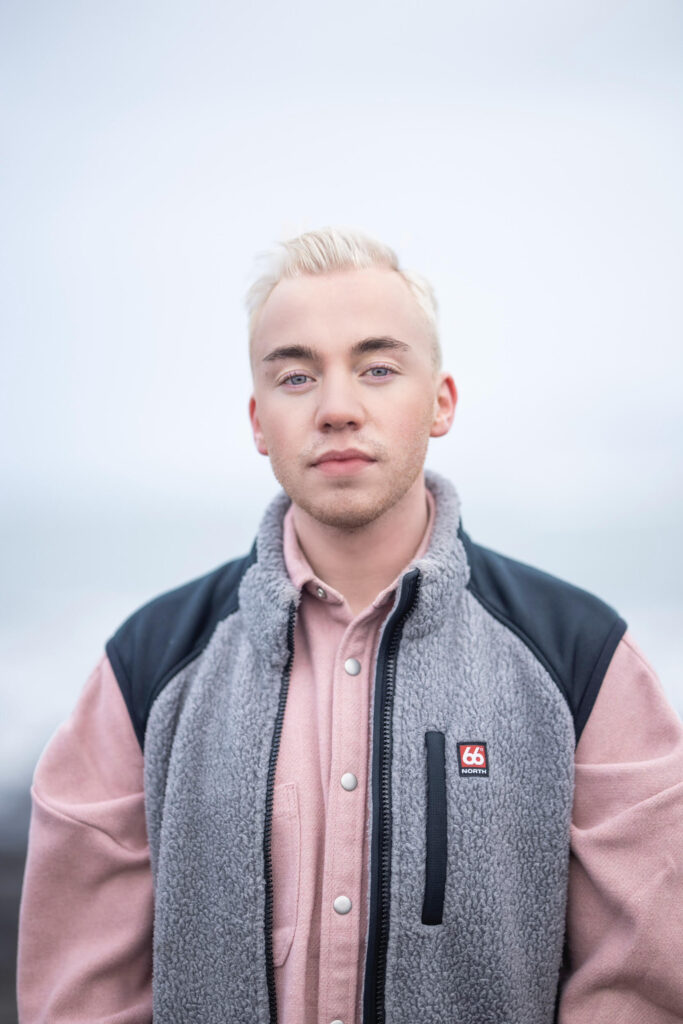Have you ever been called a fag or a dyke in your schoolyard when you were a kid, bullied in the lockers or on your way back home because you were not quite as masc or fem as you were expected to be and wish you would never have to go back to school after that ever again? If you read this, I bet you have. If not: lucky you! 27-year-old Úlfar Viktor has had his fair share of harassment when he was a kid. Now he has graduated from University of Reykjavík with a bachelor’s degree in psychology and wrote his final paper on an uncomfortable and often-overlooked issue: the impact of both homophobia at school and parental involvement on LGBT+ kid’s mental health. The results of his study might surprise you.
What prompted you to write your Bachelor final paper on LGBT+ youth mental health?
“I myself am gay and have been working in child and youth work in primary schools for several years. There I have noticed patterns of behavior where homophobic slurs and harassment have been “allowed” to take root without any action being taken by teachers or other school staff. The words faggi (fag) and hommi (gay) are used in a degrading sense every day in primary schools today. I therefore found it ideal to research this further for my Bachelor final paper.”
“The words faggi (fag) and hommi (gay) are used in a degrading sense every day in primary schools today.”
So what you are saying is that Iceland is not the LGBT+ safe haven it is often depicted as. Have you been yourself a victim of homophobia at school when you were a kid?
“Although Iceland has gone quite far when it comes to LGBTQ+ issues, there is still an underlying homophobia rooted in our society. LGBTQ+ individuals still get harassed and even beaten up still to this day. I have been a victim of physical assault for being gay, which happened a few years ago.
As a child I did get bullied and humiliated on a daily basis in school for being a small feminine boy that only had female friends. I got mocked by older students and chased up after school and harassed while my schoolbag got thrown in the trash. However, I’ve always been very lucky with my close surroundings, my family and friends have always been super supportive and for that I’m very fortunate. Thinking back, this experience definitely impacted my self-esteem and I remember not wanting to go to school and faking being sick every morning because I was scared and anxious.”
Have the school staff or your parents stood out for you then?
“The school staff did not know about those incidents as they did not get noticed or might not have witnessed it themselves. Homophobic bullies often find a spot where no adults can see. That’s where these types of harassments often take place. Homophobia and aggression towards LGBTQ+ children thrive in silence. That’s why it’s so necessary for both parents and school staff to have a continuous conversation with their children/students regarding LGBTQ+ issues and tolerance in general. It would have definitely made a huge impact if a school staff would have intervened and if my parents would have had reported those incidents to the school authorities.”

Back to your paper: LGBT+ youth mental health is a hot topic for quite some time now and multiple reports have been issued at this point. What is your take on the issue?
“I wanted to know if parental involvement affected depression or the self-esteem of LGBTQ+ adolescents. In other words, I wanted to find out if parents reporting the harassment of their LGBTQ+ children was of any help. I also wanted to examine if LGBTQ+ young people avoiding school activities had any effect on their mental well-being.”
How did you collect the data?
“I had the privilege to be trusted for the dataset from a recent online study which was conducted by Samtökin ’78 (The National Queer Organization of Iceland) and GLSEN (Gay, Lesbian and Straight Education Network).”
What did you find out?
“I found that there was in fact a significant link between school avoidance, depression and self-esteem. However, there was no significant connection between parental involvement, depression and self-esteem. After looking more into the results, I found that, in fact, it varies depending on sexual orientation and gender identity. Transgender individuals for example seem to have a greater need for parental involvement than other LGBTQ+ individuals.”
“Homophobic bullies often find a spot where no adults can see. That’s where these types of harassments often take place.”
In proportion, how many parents have you found to be uninvolved during your research?
”Only around half of the participants (54.2%) reported harassment to their parents. Students who had reported incidents to their parents/guardians were asked how often a family member had talked to school staff about the harassment, and almost one in six students (14.7%) said that their parents never actually addressed the issue with the staff. This is concerning because parents should advocate on behalf of their LGBTQ+ children when they don‘t feel comfortable addressing it themselves.“
Does your study mean that even supportive parents of LGBT+ children are relatively helpless when it comes to harassment at school and their kid’s mental health? But then: what should they do to protect their kids regardless – as they surely wish?
“In this specific study, there was no significant difference between disclosure to parent and parent reporting of harassment to depression or self-esteem. This does not mean that parental support is not important. The support of their parents is super important for LGBTQ+ children. However, it’s even more necessary for transgender children to have parents that are willing to help them when they get harassed and report it to school authorities. Many studies have shown that parental support is, in fact, very important to LGBTQ+ individuals. Parents have to provide their children a therapist or a psychologist to help them with their mental health. Conversation about LGBTQ+ issues between parents and school staff are essential for the children’s mental health and for their performance at school. School staff also need to be more awake when it comes to bullying and homophobic remarks at school.”

So who can effectively protect those kids at school and how?
“Teachers and all school staff can be a necessary protective factor for LGBTQ+ children. However, they need to build trust in those children so they can get more comfortable in reporting those harassments as well as talking about their feelings. All parents are responsible for talking to their children about tolerance and acceptance. Our opinions and attitudes do reflect on our children and their behavior at school. Thus, it’s important to talk to our children about how we should always respect each other, that it’s okay to be different and if they witness anyone getting harassed – to report it to a school staff immediately.”
“Teachers need to be educated in LGBTQ+ issues to be able to understand their LGBTQ+ students’ needs and to educate others about those issues themselves.”
As a child and youth work professional, a young researcher and a gay man, what should be done in your opinion to make schools in Iceland safer spaces for LGBT+ kids?
“Many schools have increased their non-heterosexual students’ resources, i.e., by creating protective factors like anti-bullying policies, school connectedness, and supportive educators. Those protective factors have the potential of improving the general mental health and well-being of their students as they experience increased safety. Schools can start by making supportive educators a priority. Teachers need to be educated in LGBTQ+ issues to be able to understand their LGBTQ+ students’ needs and to educate others about those issues themselves. Studies have shown that teachers and healthcare providers have reported a lack of education in LGBTQ+ issues.
There are multiple ways in making non-heterosexual students feeling welcomed at their schools. Teachers can make their environment more inclusive by hanging up LGBTQ+ posters on the wall in classrooms, advocating for the inclusive use of pronouns for all, making school material that’s inclusive and not heteronormative, making an “ally week” once a semester or at least once a year where students get education about LGBTQ+ issues and make posters, having an all-gender restroom, etc. This creates a positive and healthy school climate for all students.”


